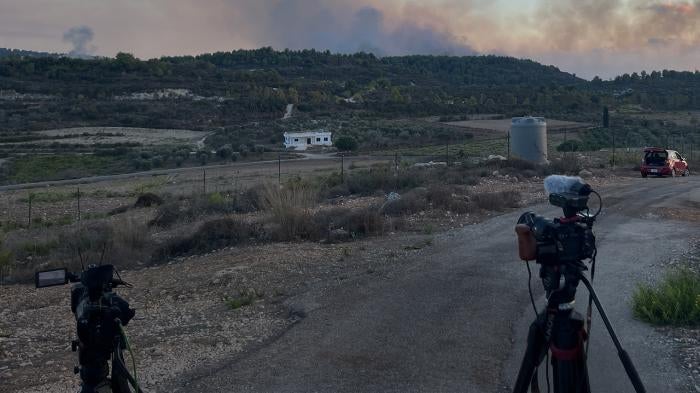(Beirut) - A United Nations-mandated commission of inquiry should investigate the Israeli military’s killing of the Lebanese journalist Issam Abdallah in October 2023, 11 nongovernmental groups including Human Rights Watch said in a joint letter dated September 13, 2024, to the Independent International Commission of Inquiry on the Occupied Palestinian Territory, including East Jerusalem.
In December 2023, Human Rights Watch found that the two Israeli strikes that killed the Reuters journalist and injured six other journalists apparently constituted a deliberate attack on civilians and was thus a war crime.
“Given the continued impunity for the killing of Issam Abdullah, other journalists, and civilians, UN investigators should urgently examine this attack and publish their findings,” said Ramzi Kaiss, Lebanon researcher at Human Rights Watch. “The commission should identify those responsible to strengthen efforts to secure justice for the attack.”
The UN Human Rights Council established the Commission of Inquiry in 2021 with a mandate “to investigate, in the Occupied Palestinian Territory, including East Jerusalem, and in Israel, all alleged violations of international humanitarian law and abuses of international human rights law leading up to and since April 13, 2021.” On October 10, the Commission of Inquiry announced that it is “collecting and preserving evidence of war crimes committed by all sides since October 7, 2023.”
The organizations urged the commission to collect, analyze, and preserve information about the attack in Lebanon and publish its findings. The organizations urged the Commission to review the findings of Human Rights Watch, Amnesty International, Agence France Press (AFP), and Reuters about the attack. The commission should send formal requests for information to the governments of Israel, Lebanon, and the United States, given that one of the survivors, Dylan Collins, is a US citizen, the groups said.
Investigating this attack would bolster efforts to end impunity for serious crimes committed against journalists since October 7, 2023, Human Rights Watch said. More than 100 media employees have been killed by Israeli forces in Gaza since the start of the hostilities.
Multiple investigations found that the attacks on the journalists in southern Lebanon were launched from Israel. The injured journalists were Carmen Joukhadar and Elie Brakhya from Al Jazeera, Collins and Christina Assi from Agence France-Presse, and Thaer al-Sudani and Maher Nazeh from Reuters.
Israeli authorities claimed the strikes were in response to a Hezbollah attack and denied that Israeli forces deliberately targeted civilians, but the military has released no update or result from its internal investigation of the incident.
An investigation by the United Nations Interim Forces in Lebanon (UNIFIL) found that “its personnel did not record any exchange of fire across the border between Israel and Lebanon for more than 40 minutes” before the attack, Reuters reported. UNIFIL has not made its findings public. In its investigation, UNIFIL examined the legality of the attack, whereas a UN Commission of Inquiry has a mandate to collect, consolidate, and analyze evidence; identify those responsible; establish the facts and circumstances around the attack; and make recommendations on accountability measures, including for individual criminal and command responsibility.
Witness accounts and video and photo evidence that Human Rights Watch verified indicate that the journalists were at a considerable distance from ongoing hostilities, clearly identifiable as members of the media, and had been stationary for at least 75 minutes before they were hit by two consecutive strikes. Human Rights Watch found no evidence of a military target near the journalists’ location, nor did other rights and media groups.
Evidence reviewed by Human Rights Watch indicated that the Israeli military knew or should have known that the people they were firing on were civilians. Video evidence, expert audio analysis, and witness accounts suggest that the group was visible to the cameras of a nearby unmanned aerial vehicle that was most likely Israeli, within line of sight of five Israeli surveillance towers, and most likely targeted by at least one munition fired from the main gun of a tank from an Israeli military position approximately 1.5 kilometers southeast. The attack directly targeted the journalists with two consecutive strikes within 37 seconds.
Reuters found that the Israeli military most likely fired a machine gun at the journalists following the two deadly strikes. UNIFIL also reportedly concluded that the “firing at civilians, in this instance clearly identifiable journalists, constitutes a violation of [UN Security Council Resolution] 1701 (2006) and international law.”
Despite the findings of various organizations, there has been no justice for Abdallah’s killing, Human Rights Watch said. In April 2024, Lebanon’s Council of Ministers instructed the Foreign Affairs Ministry to file a declaration with the International Criminal Court (ICC) registrar accepting the court’s jurisdiction over serious crimes committed on Lebanese territory since October 7, 2023. However, the ministry never followed through, and the government eventually reversed its decision.
Accepting the ICC’s jurisdiction through a declaration would have given the court’s prosecutor a mandate to investigate serious crimes committed in Lebanon, including deliberate attacks on civilians and journalists, regardless of the nationality of the suspects.
On May 20, the ICC prosecutor, Karim Khan, announced that he was seeking arrest warrants against two senior Israeli officials and three Hamas leaders. Khan confirmed that his office has jurisdiction over crimes in the current hostilities between Israel and Palestinian armed groups that covers unlawful conduct by all parties.
“A UN-mandated investigation into the killing of Issam Abdallah would be crucial to preserve evidence for any future accountability process in a court of law,” Kaiss said. “In the meantime, Lebanon’s government should reverse course and promptly give the ICC jurisdiction to enable the court’s prosecutor to investigate grave international crimes in Lebanon.”







